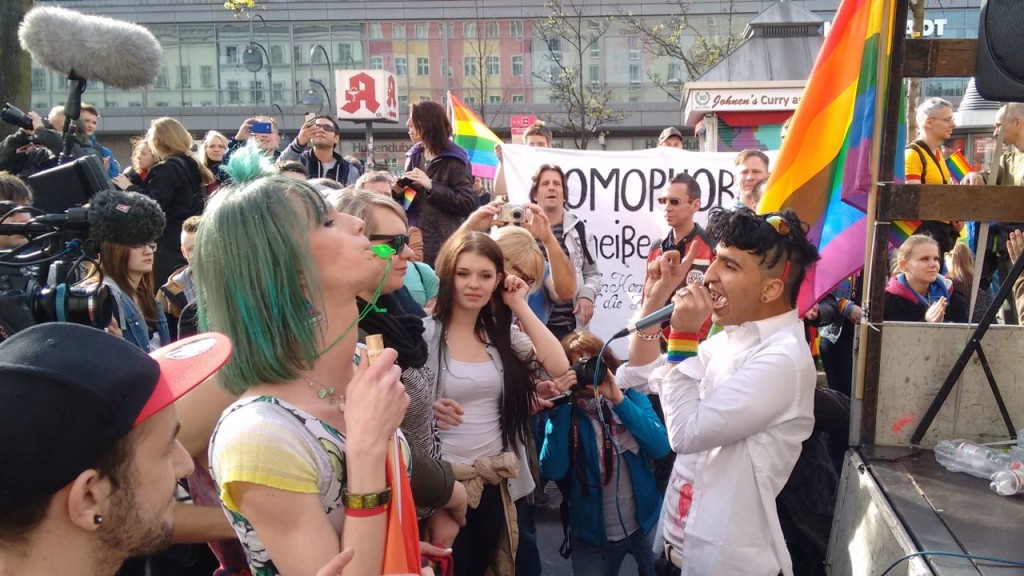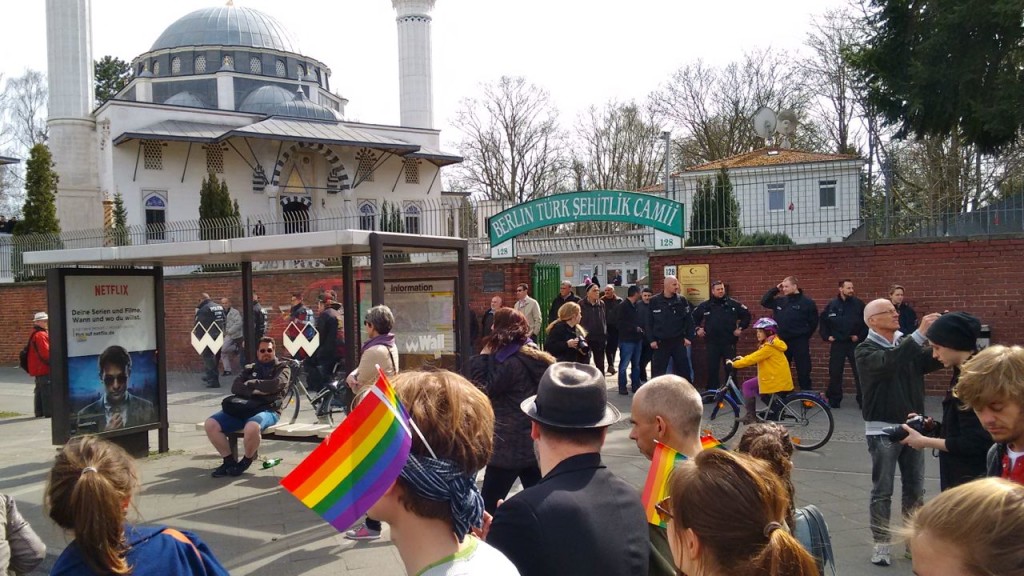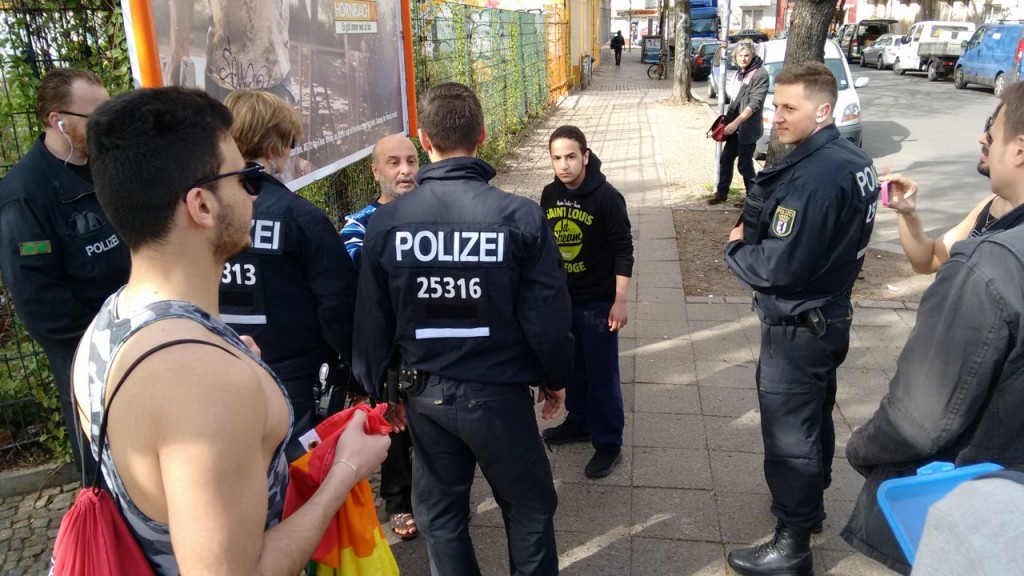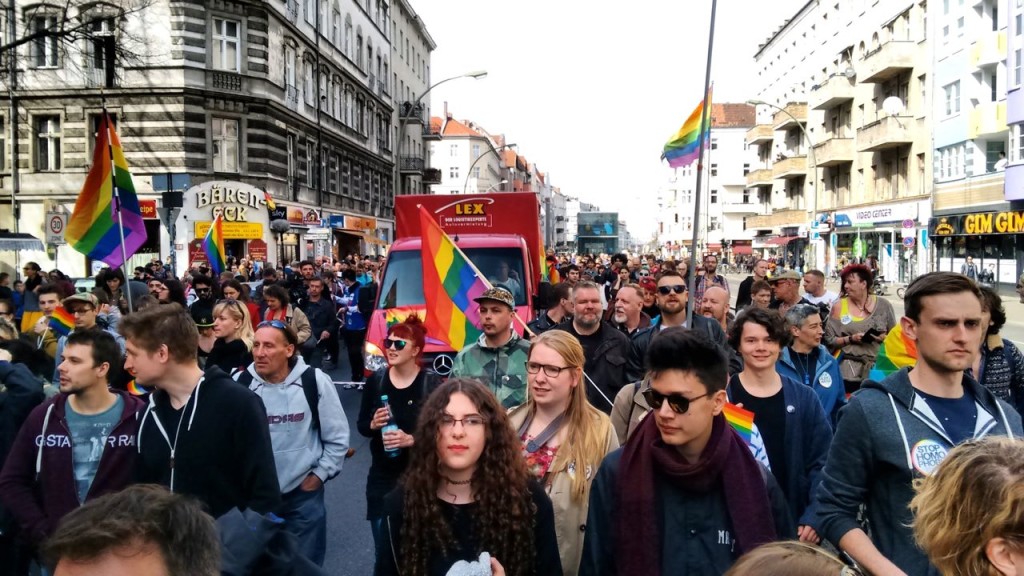Muslim, Gay, In Danger… but with Friends

Nasser is an 18-year-old gay Muslim, born in Neukölln, Berlin. He was abducted by his family at the age of 15, who tried to expatriate him to Lebanon, where either a forced marriage or worse awaited him (he was shown the image of a gallows on a cell phone). En route, an observant Bulgarian border guard discovered the young man, one foot cleverly sticking out from under a blanket. The father and uncle have since been fined, and Nasser has become an activist in his home neighbourhood, trying to argue for acceptance and tolerance as a “gay Muslim”. He lives, as a result, under death threats.

This past Sunday, he called for a grassroots demonstration, joined by 1500 locals, and 60 police officers as protection. The group, supported by speeches from German-Muslim organisations, met on Columbiadamm a few metres from the Sehitlik Mosque. As the rainbow-flag parade passed the minareted building, Nasser announced that he would show “the greatest respect” to the faithful, playing a traditional prayer over the speakers. I certainly felt the tension––the hard stares of the veiled worshippers who watched us pass, beyond the police escort––and at the same time the resolve of those within the progressive Muslim community who insist on change.
As the demonstration snaked up Hermannstraße, and looped around S-Bahn Neukölln and Sonnenallee back to Hermannplatz, we made our way through the most traditional Muslim immigrant neighbourhoods of Berlin. From the parade’s speakers came a mix of joyful dance, kitschy pop-protest songs, and Arabic and Turkish music, amplified up to the façades. In our procession, trans women danced wildly, families held up homemade placards, gay Muslims cried slogans, and Nasser grew hoarse calling to the crowd on the microphone.
The light was bright, and created an etched tableau of still observers from the windows. Families stood at their balconies to observe the passing spectacle: Neukölln’s blue collar poor, or at times arty students. There was a disappointing predictability to responses: young hipsters, older veiled women, or children, sometimes waved. But the men often stood stiff like immobile bags of flour.

The parade was grateful for the rare bursts of support: but it was clear to everyone that we were traveling through a largely homophobic neighbourhood, that was for the most part guarded, scandalised, or indifferent to the slogans of the protestors. “What kind of rights do we want? Human Rights! For Lesbian, Gays and Trans!” cried Nasser.
At times the parade was interrupted by hecklers: kids taunting and giving the crowd the finger, fireworks thrown down from a balcony, macho men storming the crowd, with the police intervening vigorously in each instance to protect the parade. I retreated to the centre of the procession at times to feel less exposed. At one point a man Nasser identified as his ‘uncle’ was subdued by the officers. As the parade adjusted to the reality of mixed response from the streets––the crowds of men jeering or staring stonily from the doorways of betting salons, casinos, or all-male teahouses; or young soccer players grinding their hips and leering against a fence––a strong sense of political urgency crept into the demonstration. Voices grew louder, the dancing grew more insistent, and the march doubled in number as it picked up passers-by. This was not your usual gay pride parade through a neighbourhood, like Schoeneberg, long in agreement with civil rights issues. This was politics; this was a confrontation through the windows of the homes of those who do not agree. It’s been a long time since I’ve been in a gay march that wasn’t aimed at the converted.
But what was achieved on Sunday in Neukölln? Is the demand that traditional cultures, and Islam, accept gay people an unrealistic expectation? Or do we need only look 50 years into the past of the West to see how much once-conservative societies have changed? Is Nasser opening himself up to too much danger? Or is the risk paying dividends: he is precisely why so many came out, because of his bravery. Is not the first step visibility, despite the dangers? And visibility brings reactions: opposition but also solidarity. Perhaps the parade’s voices reached inside a window somewhere on a Neukölln street, so that the many other Nassers trapped there inside know they are not alone.


What I heard on the radio about the protest ist, that at least in the beginning, some official representatives of the muslim community marched along with the crowd. That looks like some progress on paper at least.
Hi Flo, yes, that’s something I allude to in the piece. One of the most important things about this march is that it was initiated by a gay Muslim for his own community. There were speeches in support at the beginning of the march by a trans Muslim activist and also by a Muslim community NGO. One of the tricky things about writing this piece was to point out the reality, recognised by the protestors (who need our solidarity), that there are very high levels of homophobia in Berlin’s Muslim communities. Indeed, one survey observes that 2/3 of German teenagers of Turkish origin express deeply homophobic attitudes. On the other hand, it’s very important not then to assume that all Muslims in Berlin are homophobic––in fact, the most vocal and committed activists on Sunday came precisely from that community, individuals who identify both as Muslim and gay, lesbian and trans, etc..
not all muslims in berlin are homophonic, once a month the berlin gay muslim scene party at SO36.
Hi Bettina,
I am in complete agreement with you: and that’s precisely the point of this article, the protest covered by this blog post was organised by Muslims for Muslims in Berlin.
And I agree, the Gayhane party at SO36 is great.
Best wishes, Joseph